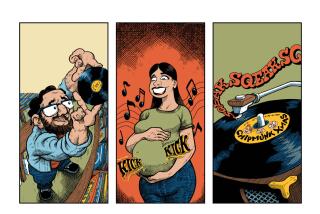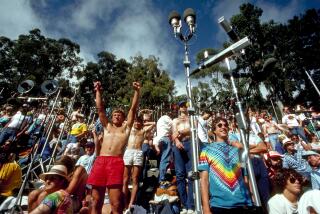Audiocassette Tapes Have a Way With Words
- Share via
They are used to study literature, history and foreign languages and to prepare for college entrance or civil service exams.
People listen to them to thin their thighs or improve their sex life, to learn how to live with cancer, recognize eating disorders and chart the astrological leanings of their loved ones. Some are programmed with subliminal messages to stop smoking, gain self-confidence or lose weight.
In fact, all indications are that there’s a booming interest in cassette tapes with words instead of music--that part of the tape business that the industry calls “spoken audio.”
These tapes include everything from F. Murray Abraham reading “The Phantom of the Opera” to “Jane Fonda’s Fitness Walkout,” from “60 Minutes to Smart Sex” to “How to Write a Hit Song,” and they seem to be taking over many bookstores, gobbling up space formerly devoted to music cassettes and even books.
Although industry sources say that there are no hard numbers on national sales, a survey by Publishers Weekly magazine last summer reported that of 300 booksellers contacted, about 200 were selling spoken audiotapes and 75% of those stores had begun selling them in the last three years.
In Hollywood, Sheldon McArthur, manager for B. Dalton Bookseller, said sales at his shop had increased 70% since June 1, with the number of shelves occupied by spoken audio expanding from three to 40.
“There has been an incredible increase in the past six months,” agreed Michael Sgriccia, district manager for 10 Waldenbooks stores in West Los Angeles and the San Fernando Valley.
Doug Dutton, owner of Dutton’s Brentwood Book Store, said audiotape sales more than tripled during 1987, from 10 a week at the start of the year to 30 to 50 now.
And across town in Montebello, Renee Hollis, assistant manager of B. Dalton Bookseller, said sales there have doubled in the last year.
Buyers seem to use the tapes--which average $7.95 to $9.95 for single cassettes--for purposes almost as varied as the tapes themselves.
Long Beach importer Byron Pollitt recalls his delicious reaction to listening to Winston Churchill’s six-volume history of World War II during frequent commutes between Los Angeles and San Diego.
“When I’m listening to books on tape, I lose all track of time,” he said. “I could be commuting 30 minutes or an hour and it wouldn’t make any difference. I become totally engrossed.
Learns Foreign Languages
“I have even gotten home and stayed in the garage for five minutes to listen to a particularly exciting part.”
Pollitt is now using language tapes to learn Spanish so he can speak to a large part of his work force.
Psychologist Barbara Lasser of Huntington Beach often attends professional conferences where she purchases tapes of a talk she’s just heard. She also orders tapes on specialized subjects from the California Medical Assn.
Lasser likes to plug the tapes in when she exercises or gets dressed. “It gives me a chance to use my down-time more efficiently,” she said.
Although “books on tape” have been around since the 1960s, many people believe that the current appetite for tapes that inspire and instruct is being fueled by the ongoing national interest in self-improvement.
Amazing Variety
In Bob Perry’s tape library, for example, there’s a discussion of the origins of the nuclear arms race, but he also finds psychological messages valuable. Perry, who’s vice president of a Santa Monica production company, frequently buys tapes of lectures he attends--on forgiveness, positive thinking, letting go of fear or the development of successful relationships.
Describing the agents, lawyers and producers he deals with as under tremendous financial pressure and divided between “the mensches and the outpatients” he said that the tapes have “. . . really had a big influence on handling the stresses and strains of my business, which is really up and down, so I’m thankful.”
Although the tapes available to consumers such as Perry come in a bewildering variety of titles, most fall into one of the categories suggested by the Publishers Weekly survey. The cassettes present recorded books, children’s subjects or vintage radio shows. They teach self-hypnosis or offer tips on business, motivation and fitness.
While the majority of audiotapes have created little controversy, the same can not be said for those that contain subliminal, or subconscious, messages.
Masking Suggestions
A firm called Mind Communications, Inc., of Grand Rapids, Mich., offers about 280 titles that use music or sounds of the ocean to mask subliminal suggestions.
J. R. Jablonski, a consultant for Mind Communications, said that all company products carry a printed list of the subliminal messages on the tape, to ease listeners’ fears that they may be unwittingly manipulated. A tape aimed at improving young people’s study habits, for example, includes the subliminals:”I review often. I do it now. I schedule time to study. I remember easily. I take good notes.”
Jablonski said that although listeners must be motivated for the tapes to be successful, his experience has shown that the subliminal cassettes do work.
A local psychologist who has studied them disagreed. “There is little or no scientific evidence that subliminal stimulation can initiate subsequent behavior,” said Robert Gable, a professor of psychology at the Claremont Graduate School.
Many Are Skeptical
An article in the July, 1985, issue of Psychology Today was similarly skeptical. “A century of psychological research supports the general principle that the more intense the stimulus the more effect it will have on our behavior,” wrote Toronto psychology professor Timothy E. Moore.
People who have studied all types of spoken audio say that the genre has a long history. Jerry McKee, editor and publisher of the Audio-Cassette Newsletter in Glendale, noted that “the Audio-Digest Foundation had abstracts on current medical literature on open reel tapes as early as 1954.”
But “it was only with the advent of the cassette recorder and the Walkman concept in the 1970s and ‘80s that you had people coming up with ideas of recording complete novels word for word,” said Joe Saltzman, chairman of broadcasting at the USC School of Journalism. “Suddenly people wanted to carry around things other than music. You’re in the car and you could read a novel by listening to it.”
Health and psychology self-help tapes grew “in separate parallel lines” with recorded books, Saltzman said, simply because “people like to improve their lives.”
Bob Perry looks to his tapes for more fundamental help: “When my life is disoriented or overwhelmed by the forest of confusion that is Los Angeles,” he said, “they’re kind of like the voice in the wilderness--like your shrink or your best friend or whomever you go to to get you through.”
More to Read
Sign up for our Book Club newsletter
Get the latest news, events and more from the Los Angeles Times Book Club, and help us get L.A. reading and talking.
You may occasionally receive promotional content from the Los Angeles Times.










